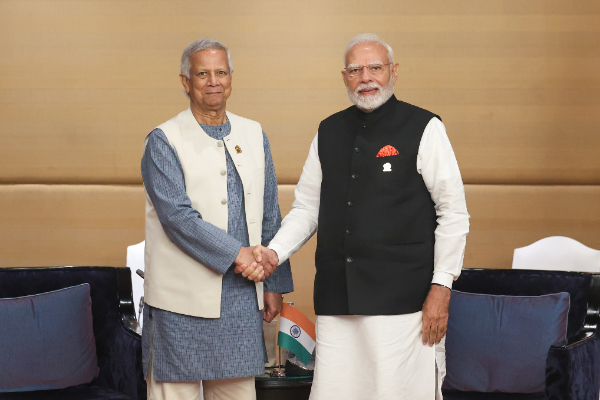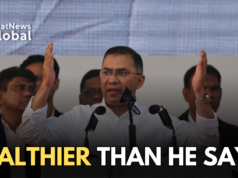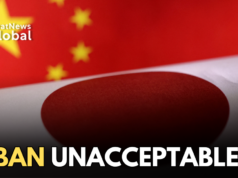
Indian Prime Minister Narendra Modi on Friday met Bangladesh interim government chief Muhammad Yunus on the sidelines of the ongoing BIMSTEC Summit in Bangkok, days after the Nobel Laureate’s comment on Northeast India triggered a row.
This is the first time Modi and Yunus have met since he took charge of Bangladesh’s interim government following former Prime Minister Sheikh Hasina’s ouster amid severe student-led mass protests.
The relationship between India and Bangladesh turned frosty following the toppling of Hasina’s regime, who is seen as a pro-Delhi leader.
Hasina fled to India following the sudden end of her regime on August 5, 2024, months after she came back to power by winning the general polls.
India expressed concerns over the rise in atrocities against minorities in the South Asian country following Hasina’s exit.
The meeting occurred amid Dhaka’s growing closeness with China.
Cherry-Picking
Indian Minister of External Affairs S Jaishankar on Thursday targeted Bangladesh Interim Government chief Muhammad Yunus over his comment on ‘North-East’ and said cooperation is not subject to “cherry-picking”.
Speaking at the 6th BIMSTEC Summit in Thailand, Jaishankar sent out a strong message to Yunus and his administration and said India has the longest coastline in the Bay of Bengal.
Jaishankar said, “India is aware of its special responsibility in regard to BIMSTEC. We, after all, have the longest coastline in the Bay of Bengal, of almost 6500km.”
Countering Yunus’s remarks, he said India’s Northeast region has now emerged as a connectivity hub for the BIMSTEC.
“India shares borders not only with five BIMSTEC members, connects most of them, but also provides much of the interface between the Indian Sub-continent and ASEAN. Our North-Eastern region in particular is emerging as a connectivity hub for the BIMSTEC, with a myriad network of roads, railways, waterways, grids and pipelines. Furthermore, the completion of the Trilateral Highway will connect India’s North East all the way to the Pacific Ocean, a veritable game-changer,” he said.
“We are conscious that our cooperation and facilitation are an essential pre-requisite for the smooth flow of goods, services and people in this larger geography,” Jaishankar said.
“Keeping this geo-strategic factor in mind, we have devoted increasing energies and attention to the strengthening of BIMSTEC in the last decade. We also believe that cooperation is an integrated outlook, not one subject to cherry-picking,” he said.
Yunus’s Controversial Remark
In a video which went viral on social media, Yunus was probably during his four-day trip to China had made a controversial comment, referring to India’s Northeast as an opportunity for Beijing’s economic expansion.
Yunus was heard saying, “The seven states of India, the eastern part of India, are called the seven sisters. They are a landlocked region of India. They have no way to reach out to the ocean… This opens up a huge possibility. This could be an extension for the Chinese economy.”
The bilateral tension between India and Bangladesh brewed after the fall of the pro-Delhi Sheikh Hasina government in August last year, followed by attacks on minorities in the South Asian country.
After Hasina fled to India, facing violent protests that started with anti-quota agitation, Yunus was appointed as the advisor to the interim government in Bangladesh.
(With inputs from IBNS)




